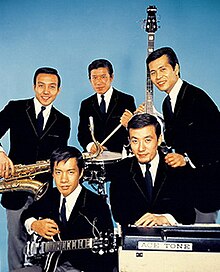You can help expand this article with text translated from the corresponding article in Japanese. (November 2022) Click for important translation instructions.
|
| Jackey Yoshikawa and His Blue Comets | |
|---|---|
 | |
| Background information | |
| Origin | |
| Genres | GS |
| Years active | 1957 – 2021 |
Jackey Yoshikawa and His Blue Comets ( Japanese: ジャッキー吉川とブルー・コメッツ) is a Japanese GS band, active from 1957.
History of the band
The band formed in 1957 just as The Blue Comets. In 1963 they renamed "Jackie Yoshikawa and the Blue Comets" with Jackie Yoshikawa serving as the leader of the group. Their debut single "Aoi Hitomi" ("Blue Eyes") was an immediate success, selling over 100,000 copies in its English-language version and over 500,000 copies in its Japanese-language version. They appeared on The Ed Sullivan Show performing their major hit song of 1967 "Blue Chateau" (ブルー・シャトウ, "Burū shatō"), which won a Japan Record Award and sold over one million copies Thanks to their popularity, they were the first musical group invited to participate in a Kōhaku Uta Gassen contest. Their last song to chart was "Ame no Hymn", which was released in January 1971 and reached the No. 65 on the Oricon Chart.
In October 1971 Tadao Inoue, Kenji Takahashi, and Tsunaki Mihara left the group, replaced by new members. Tadao Inoue committed suicide by hanging in May 2000. The surviving members of the original line-up reunited in October 2001. The leader of the band Jackey Yoshikawa died in May 2020.
References
- ^ "ジャッキー吉川とブルー・コメッツ ~デビューから解散まで~". GroupSounds (in Japanese). Retrieved 9 November 2022.
- ^ "「ブルー・コメッツ」ジャッキー吉川さん死去 「ブルー・シャトウ」が大ヒット - スポニチ". Sponichi Annex (in Japanese). Retrieved 9 November 2022.
- ^ "ブルーコメッツ井上忠夫さん自殺". Shikoku News. 19 August 2000. Archived from the original on 2 September 2014. Retrieved 9 November 2022.
{{cite news}}: CS1 maint: bot: original URL status unknown (link)
External links
- Jackey Yoshikawa and His Blue Comets at AllMusic

- Jackey Yoshikawa and His Blue Comets discography at Discogs

- Jackey Yoshikawa and His Blue Comets discography at MusicBrainz
